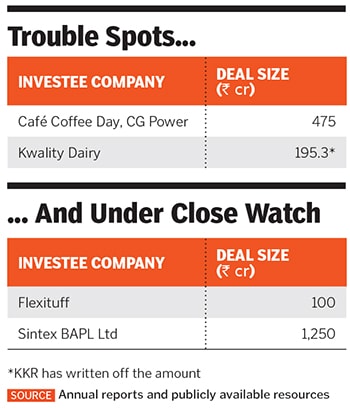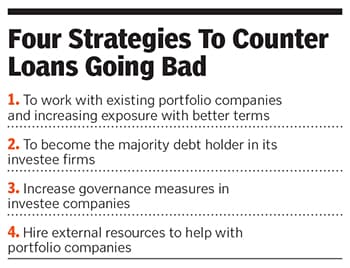
KKR's dice with debt
Lessons for the global private equity giant from lending transactions that have gone sour in an era when governance levels have hit new lows. Two key takeaways: The need for more due diligence and a proactive, eagle eye on the debt portfolio
 “Governance is a key area and, in this credit climate, we anticipate spending greater time looking at the governance aspects of a deal” - Sanjay Nayar, CEO, KKR India
“Governance is a key area and, in this credit climate, we anticipate spending greater time looking at the governance aspects of a deal” - Sanjay Nayar, CEO, KKR IndiaImage: Vikas Khot
The turmoil in the Indian non-banking finance companies (NBFCs) isn’t sparing the lending books of private equity (PE) funds either. Global PE giant KKR, which lends in India through its two credit arms—KKR India Financial Services Pvt Ltd, the wholesale lending arm, and KKR India Asset Finance Pvt Ltd, to real estate firms—has witnessed some of its investments in its corporate lending book turn sour. The pain is largely being felt at KKR India Financial Services (KKRIFS), the NBFC.
Over the last year, KKRIFS’s debt investments in companies like Kwality Dairy, CG Power and Industrial Solutions, and Coffee Day Enterprises Ltd have floundered. According to Forbes India estimates, the collective exposure to two credit investments—CG Power and CCD—stands at nearly ₹475 crore of KKRIFS asset book of ₹6,200 crore as of March 2019. It has completely written off its exposure in Kwality Dairy last year. The total number of loans and bonds on the books of KKR India Financial Services was under 50, with reported net non-performing assets at under 2 percent.
Last October, KKRIFS India took Kwality Dairy to the National Company Law Tribunal (NCLT), and has already written off the investment from its book. According to Kwality’s last publicly available annual report, for FY18, it owed ₹195 crore to KKR India. In July 2016, the company had publicly announced that it managed to raise ₹520 crore from KKR India in a structured finance transaction for its consumer facing business. The debt-ridden company, which has eroded 98 percent of investor wealth in the past two years, is in NCLT awaiting its resolution.

The Gautam Thapar-promoted CG Power and Industrial Solutions has also come under the scanner, with KKR India finally acquiring just under 10 percent in the company in mid-September by invoking its pledges. On September 17, the Securities and Exchange Board of India (Sebi) issued an order restraining Thapar from accessing the securities market.
The order further said that it requires BSE Ltd to appoint an auditing firm to conduct a detailed forensic audit of the books of the accounts of the company from 2015-16 till date. CG Power in its notice to shareholders on August 19 had stated that the total liabilities of the company and the Avantha Group may have been potentially understated by approximately ₹1,053.54 crore and ₹1,608.17 crore respectively, as on March 31, 2018; and by ₹601.83 crore and ₹401.83 crore, respectively, as on April 1, 2017. Moreover, advances to related and unrelated parties of the company and the Group may have been potentially understated by ₹1,990.36 crore and ₹2,806.63 crore respectively, as on March 31, 2018; and by ₹1,479.34 crore and ₹1,331.47 crore, respectively, as on April 1, 2017.
Café Coffee Day, for its part, restated its debt in mid-August at ₹4,970 crore. It is in the process of selling non-core assets to reduce its debt obligations.






